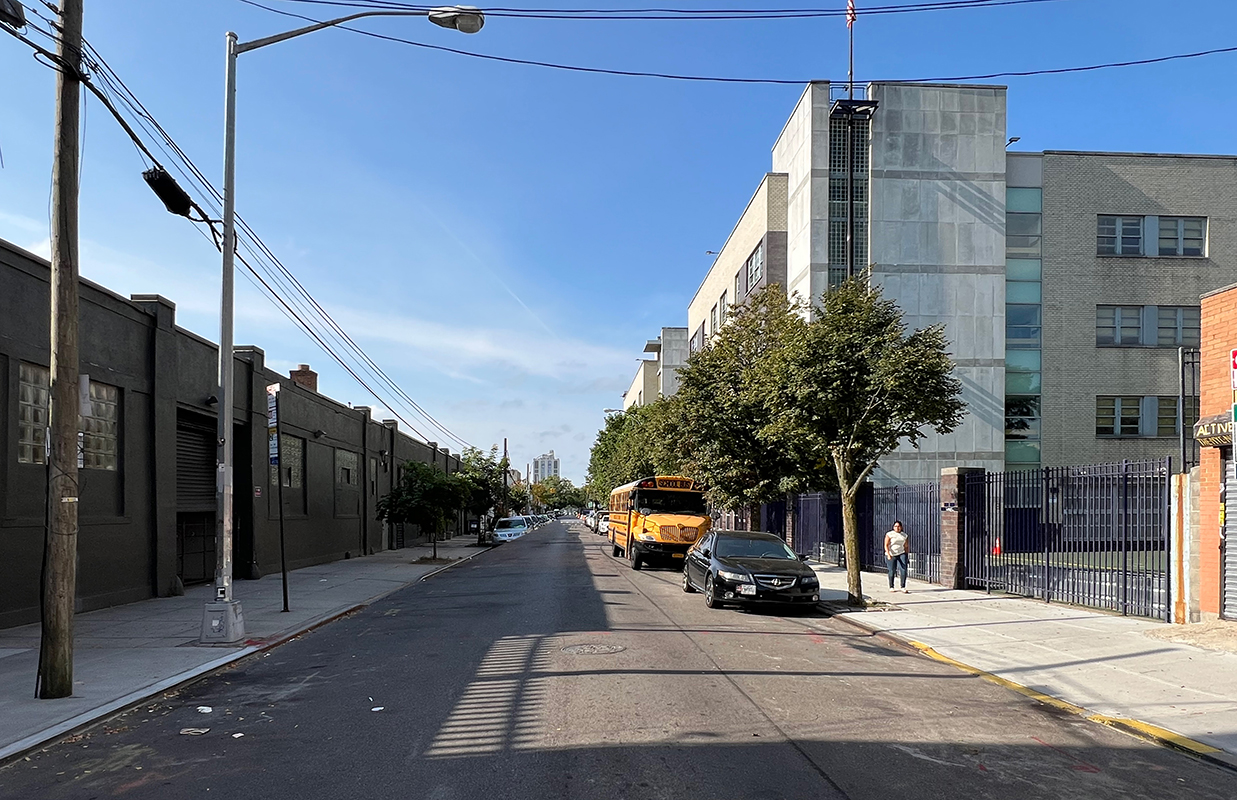
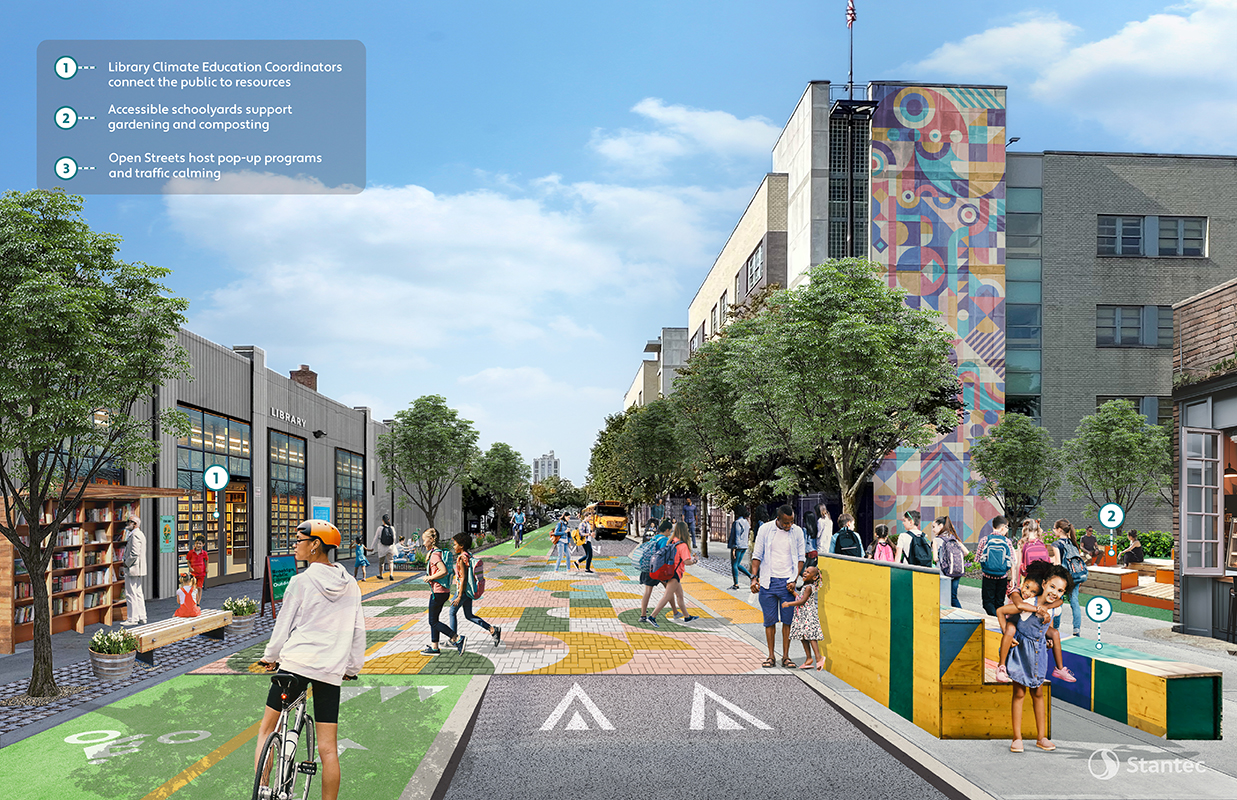
To improve access to climate education and green job resources, the City should empower public libraries as “climate hubs” to enhance climate literacy.
By Ankita Chachra, Caitlin Harris, Lloyd Helen, Christina Hernandez, Catherine Joseph, Anna Keleher, Andrew Leung, Kelley Tapia, Yi Zhang
The Need
Public libraries, among the most accessible institutions in the city, play a vital role in fostering learning. Attendance and program participation across the three library systems have continued to rebound and grow post-COVID-19. In the New York Public Library System (NYPL) alone, over 7.3 million people have visited and over 1 million have participated in NYPL’s diverse range of programs. Similar increases in program attendance are observed across all three library systems.
As vital community hubs, public libraries have the potential to expand their educational influence to include climate education. This can empower patrons to connect with opportunities for professional development as the decarbonization economy grows.
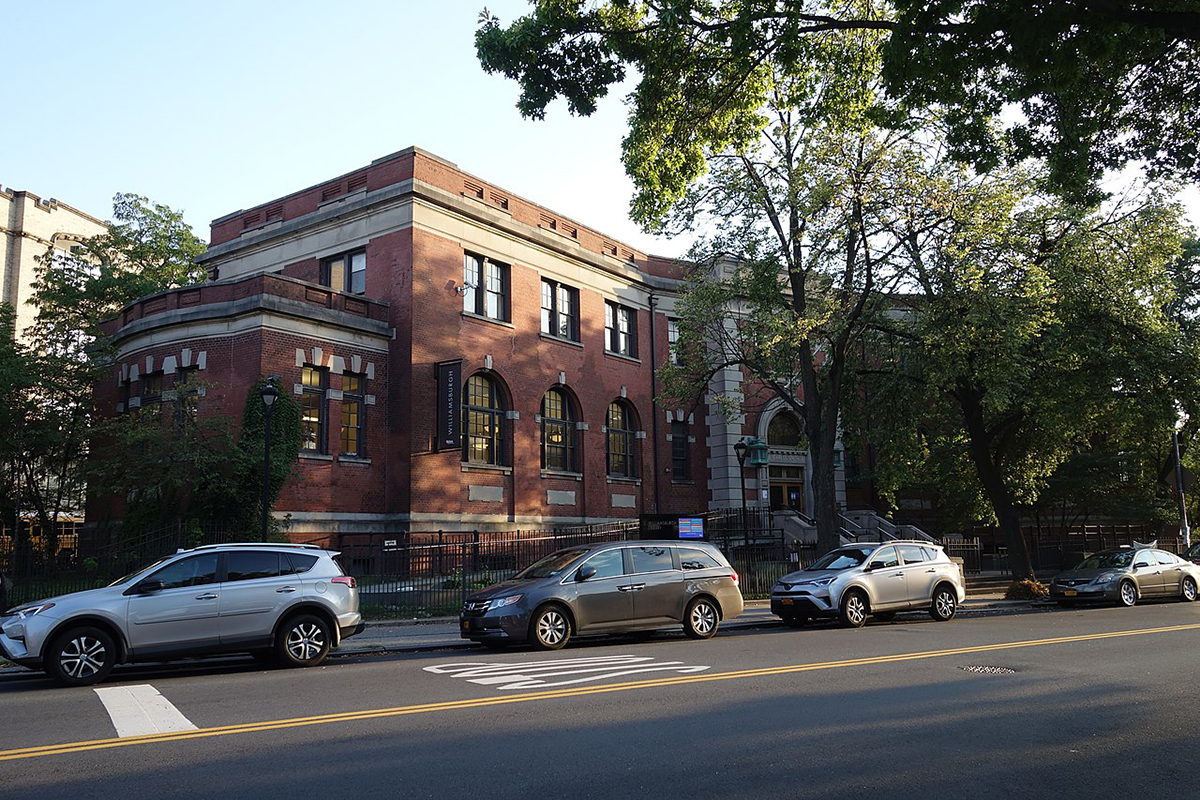
As vital community hubs, public libraries have the potential to expand their educational influence to include climate education. This can empower patrons to connect with opportunities for professional development as the decarbonization economy grows.
While New York City has made strides in decarbonization through initiatives like the Climate Mobilization Act’s Local Law 97, there has been limited focus on engaging residents through climate education efforts. According to the North American Association for Environmental Education, climate literacy is understanding your influence on climate and climate’s influence on you and society.(1) Educating residents supports them on how to respond and address climate change, and on the opportunities for green career pathways. Improving climate literacy is crucial, as it enhances the city’s capacity to address both decarbonization and environmental justice.
While some libraries offer climate-related programming, such as the Greenpoint Library, these efforts are often dependent on staff capacity and interest, targeted at a narrow audience, or lacking connections to other neighborhood programs and opportunities. Inconsistent funding for library staff and programming can lead to unpredictable schedules and access across different branches. Strengthening public libraries’ role as essential community resources and securing consistent funding for climate literacy and training initiatives will enhance the connection between decarbonization efforts and library patrons.
The Vision
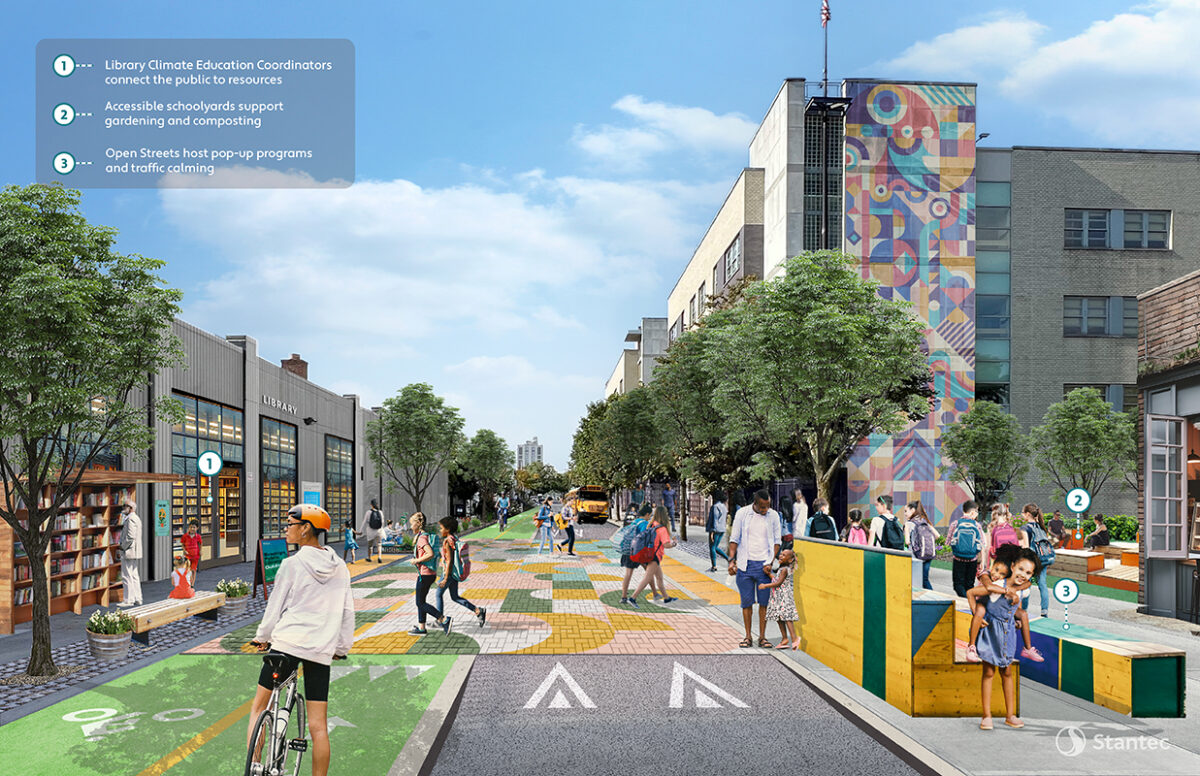
To advance a citywide vision for community-scale decarbonization, we propose empowering public libraries as “climate hubs” to enhance climate literacy. By utilizing libraries’ physical sites and access to educational resources, we can improve professional opportunities and encourage climate advocacy in each neighborhood. As community anchors, libraries have the potential to connect residents and organizations, fostering networks within neighborhoods and across the city. In alignment with New York City’s Green Economy Action Plan, libraries can play a crucial role in preparing New Yorkers of all ages to seize opportunities for economic advancement in the growing green economy.
Public libraries in New York City — including the New York, Brooklyn, and Queens Public Library systems — can serve as designated neighborhood “Climate Hubs.” These hubs can provide localized access to educational seminars, showcase decarbonization-focused technological innovations, and host workforce training opportunities. By sharing knowledge with the local community, libraries can support professional development, career advancement, energy-related financial stability in households, and a deeper understanding of climate change and decarbonization across all age groups.
Libraries are already used as Cooling Centers during extreme heat. Through this proposal, we can also build upon the City’s goals for creating Resilience Hubs, as noted in PlaNYC: Getting Sustainability Done. These hubs will be existing community spaces protected from climate hazards such as flooding and extreme heat. Although the City’s goal is to pilot these spaces with new federal funding, leveraging public libraries can help scale these efforts and tack on climate education alongside resilience, especially in underserved neighborhoods that may lack available community space.
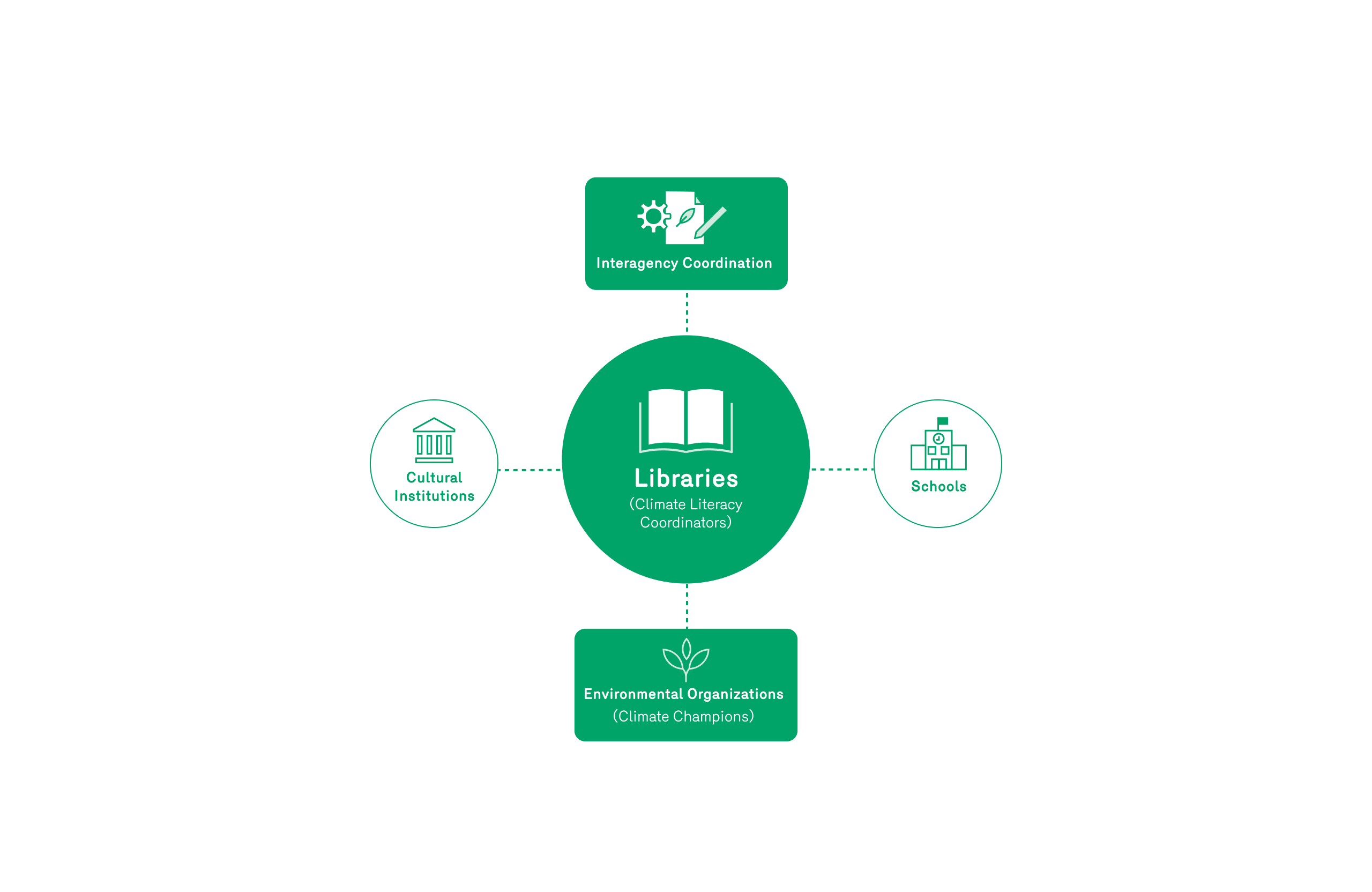
To empower libraries as Climate Hubs, the City could focus on the following strategies and actions to support climate education across the five boroughs:
→
Build a coalition of stakeholders, from citywide organizations to grassroots groups, to shape and lead climate education initiatives in libraries.
- Organize a task force of city agencies like the Mayor’s Office of Climate and Environmental Justice (MOCEJ), the Mayor’s Office of Workforce Development, NYC Public Schools, and the New York City Economic Development Corporation (NYCEDC).
- Train, empower, and compensate branch employees as Climate Education Coordinators to curate programming and serve as local climate education resources in every neighborhood.
- Engage a multigenerational group of local environmental organizations as “Climate Champions” to lead public programming and demonstrate neighborhood-specific climate initiatives.
→
Design a Climate Hub at every library branch.
- Designate underutilized areas within each library for climate-focused resources and materials.
- Retool existing programs and events to celebrate climate and decarbonization efforts.
- Fund educational and festive events for families and adults to highlight the installation of decarbonization and energy-saving technologies at the library.
- Showcase demonstrations on retrofit and passive technologies, such as the benefits of heat pump technology and strategies for improving cross-ventilation in apartments.
- Offer tours of a library’s heat pump or other retrofit technologies to connect young adults and early-career professionals with green careers.
→
Invest in programs that support workforce development, consumer education, and general awareness at every branch.
- Partner with HVAC training programs, such as NYSERDA’s Workforce Training Program or SUNY’s Clean Energy Consortium, to fund educational efforts and recruitment.
- Host regular workshops to raise awareness about programs like Con Edison’s Energy Efficiency Program and the Department of Sanitation’s Curbside Compost.
- Organize energy-related training in collaboration with community organizations focused on energy justice.
- Collaborate with “Climate Champion” organizations to offer services such as energy bill consulting and energy-reduction kits for small-scale decarbonization.
- Facilitate access to home improvement funds, such as those from the NY State Energy Conservation Bank, with programs organized by NY Green Bank to support household decarbonization efforts.
→
Support outdoor learning and enhance public space access by shaping Climate Corridors.
- Leverage the Department of Transportation’s (DOT) Open Street or Street Fair programs to offer learning opportunities along adjacent corridors.
- Build on the City’s Cool Corridors program by integrating educational events with nearby libraries.
- Utilize outdoor library spaces for climate education events, demonstrations, and community gatherings, including pop-up shading structures for compost demonstrations or air quality testing workshops.
- Support local art commissions focusing on climate science through DOT’s Art Programs, such as signage on electric poles or road paint.
- Coordinate with the Department of Parks and Recreation (DPR) and DOT to implement long-term public space improvements, creating shaded areas around library branches to reduce extreme heat and indoor cooling energy demand.
- Collaborate with community organizations, local businesses, and Business Improvement Districts along climate corridor routes to incorporate street plantings, art, and signage, enhancing spatial and social connections with the local community.
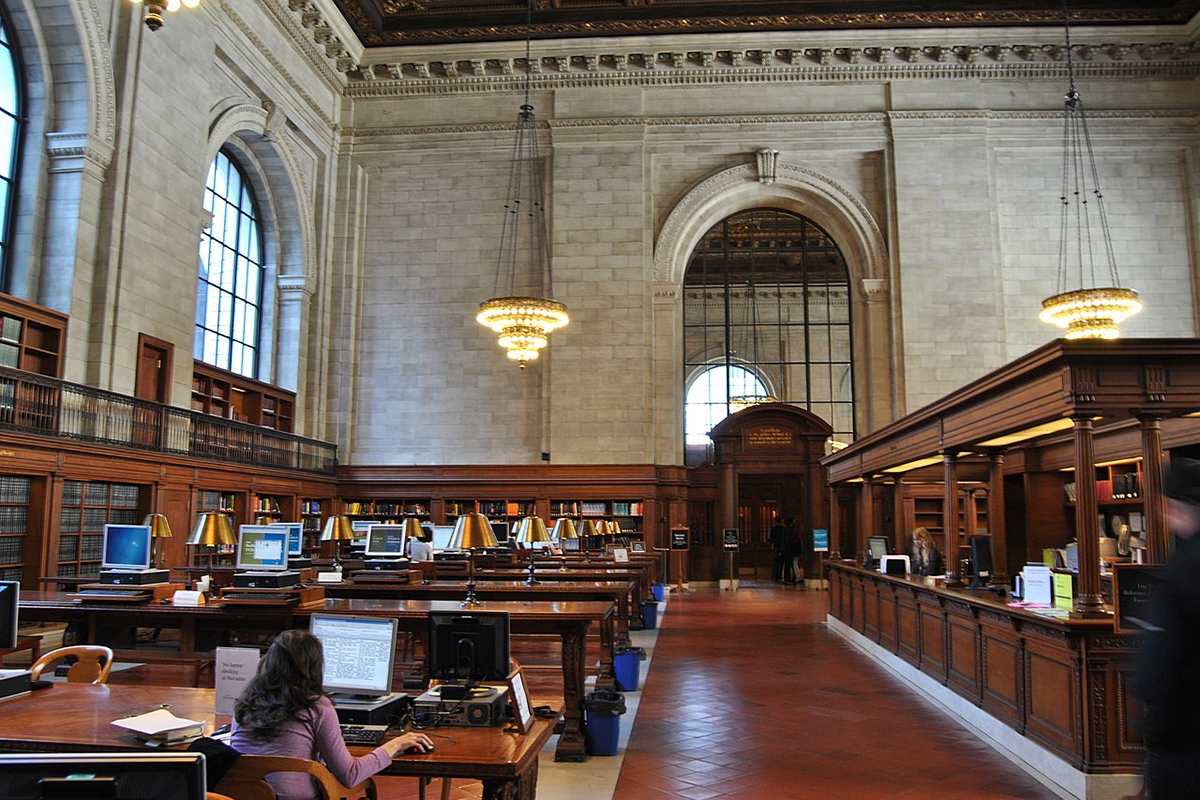
Act Now

To test the Climate Hub model, the City can pilot a Climate Corridor in an environmental justice neighborhood. An ideal location would be a library branch, such as the Kensington Library or Macon Library of the Brooklyn Public Library system, situated on streets that connect directly to local schools, such as PS179 or The Brooklyn Brownstone School respectively. Partnering with a local school could utilize NYC Public Schools’ Outdoor Learning Initiatives with climate programming. A 2021 survey revealed that only about 52% of New York City public school educators teach climate change, with many lacking training in the subject.(2) The library branch would act as the central hub for educational programming, supported by a team of agency partners such as MOCEJ, and could engage with educators to incorporate climate curricula citywide.
The pilot program could offer valuable educational opportunities for early education and K-12 students, focusing on building sustainability and public realm adaptation strategies. This might include renewable energy demonstrations, biodiversity workshops, and decentralized composting systems to integrate these learnings into residents’ daily practices.
With support from a coordinating agency like MOCEJ, the library branch could establish a Climate Corridor through the following possible pathways:
1.
Identify a library branch in an environmental justice neighborhood that could host an Open Street to support outdoor learning and increase safety measures in the vicinity of one or more schools, underscoring co-benefits of tactical public realm improvements.
2.
Work with DOT to become an Open Streets program partner to access and program neighboring street space.
3.
Co-develop neighborhood-relevant educational programming between a public school, a library, and a local community organization or community group.
4.
Engage with local artists and community members in creating climate-themed public artworks and activations through material reuse and upcycling.
5.
Marshall funding to each of the project stakeholders to support sufficient capacity and program management.
The success of the pilot Climate Corridor will be measured by active community involvement, securing necessary funding and support from public officials, and high usage metrics. Key indicators will include regular visits to pilot sites, social media engagement, and the adoption of climate-positive practices in daily life. Additionally, the implementation of sustainable practices and the impact of community events will demonstrate the project’s effectiveness and potential for expansion.
Case Studies
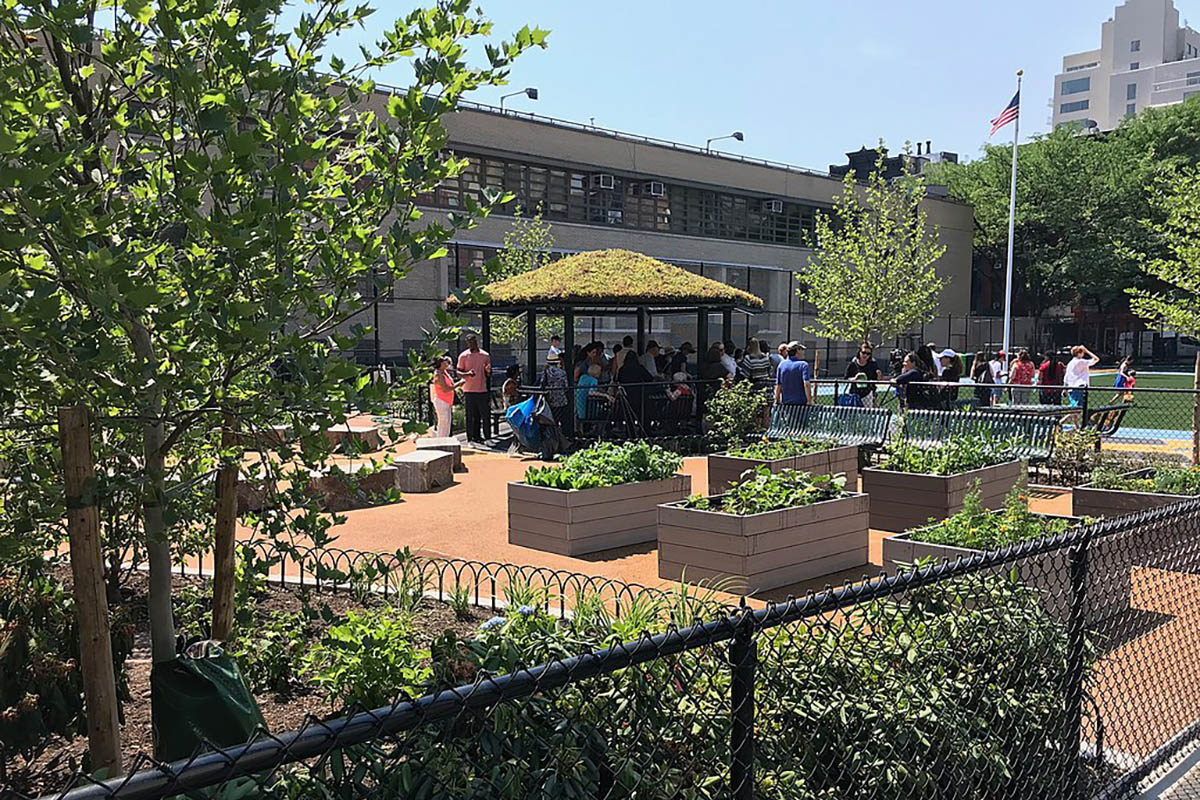
| PROJECT | OVERVIEW | IMPACT | RELEVANCE |
| American Library Association Resilient Communities Pilot | Launched in 2020-2021, this ALA pilot supported libraries in addressing climate change through community programming, aiming to raise awareness and establish resilience hubs. | Funded activities like screenings and community dialogues, granting up to $1,000 each to 25 libraries nationwide. | Highlights the role of libraries in climate education, offering a model for similar programs in NYC. |
| Greenpoint Community Development Fund | GCEF funds environmental projects in Greenpoint, Brooklyn, including the new Greenpoint Library and Environmental Educational Center. | Awarded over $17 million in grants and leveraged an additional $50.4 million, totaling over $67 million in investments. | Demonstrates effective stakeholder collaboration and resource allocation for significant environmental projects |
| DOE Showcase Schools Program | From 2014-2019, this program connected 85 NYC schools, providing 73,470 hours of training to nearly 13,000 educators through 475 visits. | Enhanced professional development and collaboration among educators, improving instructional quality across NYC. | Provides a model for supporting neighborhood institutions in driving sustainability and climate education through professional development. |
| Edible Schoolyard NYC | Integrates an edible education program into NYC schools, transforming underutilized spaces into organic gardens for hands-on learning. | Served 3,500 students with 2,178 lessons, 12,997 food distributions, and 2,878 pounds of produce harvested.(3) | Demonstrates how urban gardens can enhance environmental stewardship and community health, serving as a model for similar initiatives. |
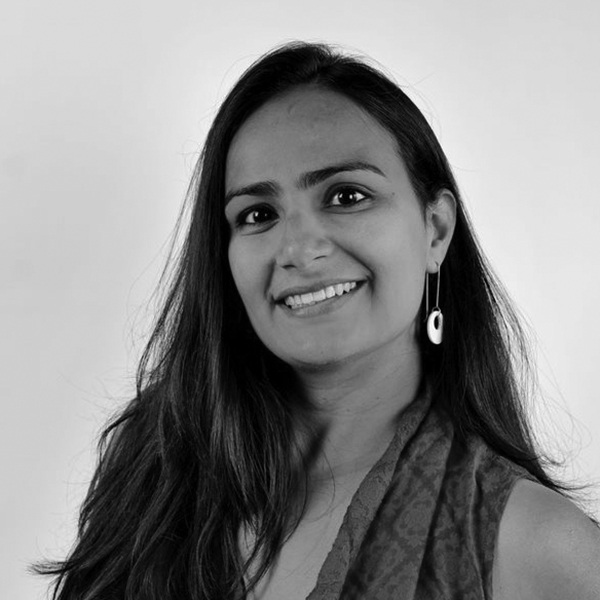
Ankita Chachra
Senior Fellow, Capita
Ankita Chachra is an independent consultant committed to building a future where all children and families thrive. She has 10+ years of global experience working in partnership with city agencies and the private, nonprofit, and philanthropic sectors. She is a Senior Fellow at Capita, a think tank with a global focus. She previously served as the Knowledge for Policy Director at the Bernard Van Leer Foundation and led the Streets for Kids Program at NACTO’s Global Designing Cities Initiative.
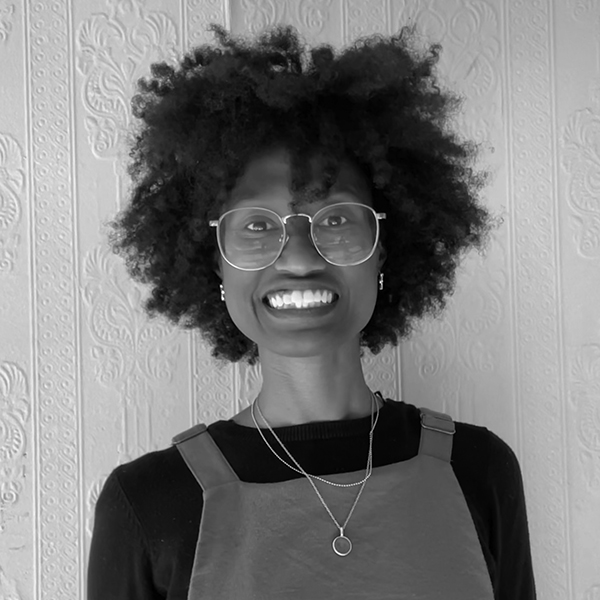
Caitlin Harris
Environmental Program Manager, Target
Caitlin Harris is currently an Environmental Program Manager at Target where she develops strategies at the nature-climate nexus. She is driven by a mission to utilize her technical skills and personal passion to enact justice-oriented design practices across public health and sustainability through various practices in community building, storytelling, communications, and education.

Lloyd Helen
Senior Associate, Cooper Robertson
Lloyd Helen is a Senior Associate at Cooper Robertson. He draws on his international background in architecture, urban design, and city planning to develop sustainable solutions across a wide range of scales and project types. Lloyd has particular expertise in arts and cultural design. He is currently working on the design of the new Princeton University Art Museum and the renovation of the Marquand Rare Books Library.
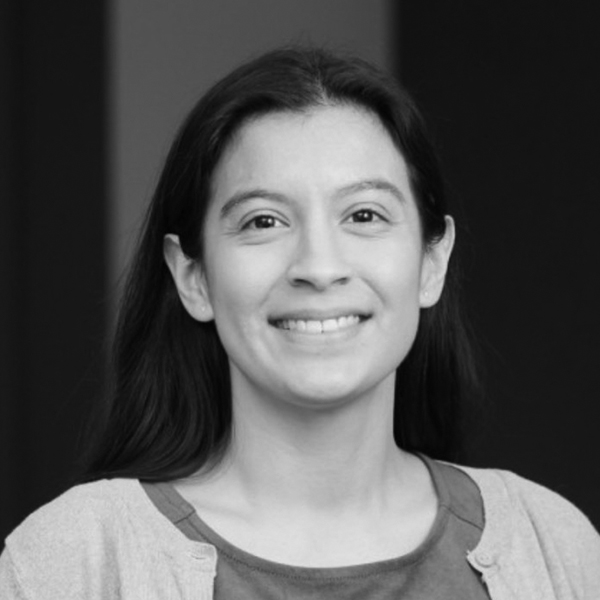
Christina Hernandez
Architect, NYC DCAS
Christina Hernandez is an architect with a background in environmental planning. As Senior Program Manager within the Division of Energy Management at DCAS, Christina partners with agencies to plan, scope, and fund comprehensive energy efficiency projects. Under her sector, she works with public libraries and cultural institutions on strategic carbon and energy reduction planning for their building portfolios’ LL97 compliance.
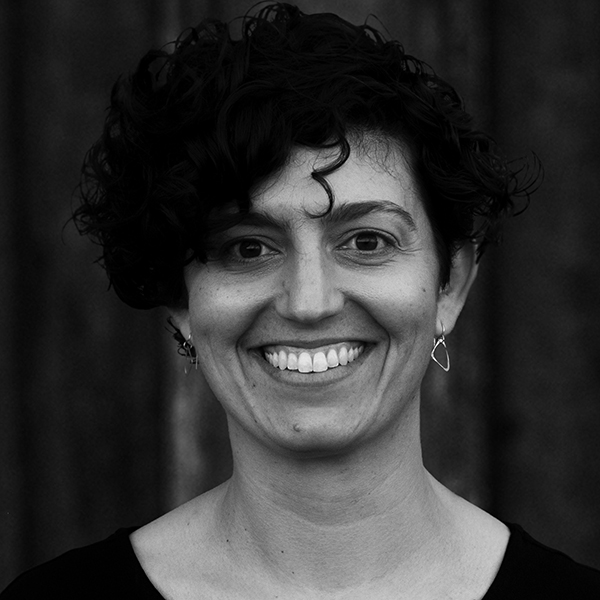
Catherine Joseph
Architect, Weiss/Manfredi
Catherine Joseph is an architect, educator, and researcher. Her work is particularly focused on leveraging design creativity and technical expertise to develop intersectional and speculative design processes that address adaptability and resilience in the built environment as well as equity in urban space. She is an Architect at Weiss/Manfredi working on higher education projects. She has experience leading the design and project management for community amenity buildings, residential developments, and commercial office buildings in the US and Canada. She has taught at RISD and NYIT as adjunct faculty in the architecture departments.
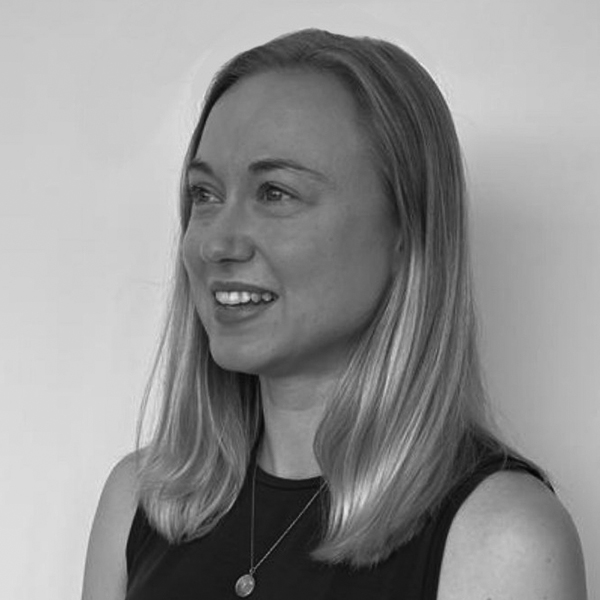
Anna Keleher
Senior Advisor, Behavioral Insights Team
Anna Keleher is a Senior Advisor with the Behavioral Insights Team (BIT) and works primarily on environment, health, and local government policy. In 2022-23, Anna worked with the innovation charity Nesta in London, where she applied behavioral insights to reduce obesity in the UK. Prior to joining BIT, she worked in several legislative and research roles in Delaware State Government.

Andrew Leung
Associate, Urban Design and Planning, SOM
Andrew Leung is an urban designer and Associate at Skidmore, Owings & Merrill’s City Design Practice in New York. He works domestically and internationally on a broad range of projects with a particular focus on the intersection of architecture and landscape, the imperatives of climate impact, and the tremendous promise of open space and the public realm. As a native New Yorker, his recent work has also included civic engagement in the city.

Kelley Tapia
Architect, Samskara Studio
Kelley Tapia, a visionary in the field of architecture with over 20 years of directing high-profile projects, stands at the forefront of sustainable and regenerative design. A licensed architect with a deep-rooted passion for nature’s genius, Kelley has dedicated her career to creating spaces that not only meet today’s needs, but also nurture future generations. Her journey in sustainable buildings is marked by a commitment to regenerative capacity.

Yi Zhang
Urban Designer & Landscape Architect
Yi Zhang is an urban designer and landscape architect with extensive international and multidisciplinary experience. Most recently, Yi contributed to research and design on climate adaptations and inequality. Yi has gained extensive expertise working with renowned practices, delivering innovative design solutions. From public realm and infrastructure planning to urban revitalizations and post-disaster redevelopments, she has demonstrated versatility in participating in projects at various scales.
1 North American Association for Environmental Education (NAAEE), “What Is Climate Literacy?” naaee.org, accessed September 12, 2024, https://naaee.org/programs/coalition/resources/what-climate-literacy.
2 United Federation of Teachers (UFT) and National Wildlife Federation (NWF), CRETF ClimEd Survey 2021, deployed by the Climate and Resilience Education Task Force in NYC (CRETF), June 11, 2021, accessed August 1, 2024, https://drive.google.com/file/d/1__Vwk0SGK1XZigV3KfA2eQ5RR1xHrNAC/view.
3 Edible Schoolyard NYC. Accessed August 28, 2024. https://www.edibleschoolyardnyc.org/.